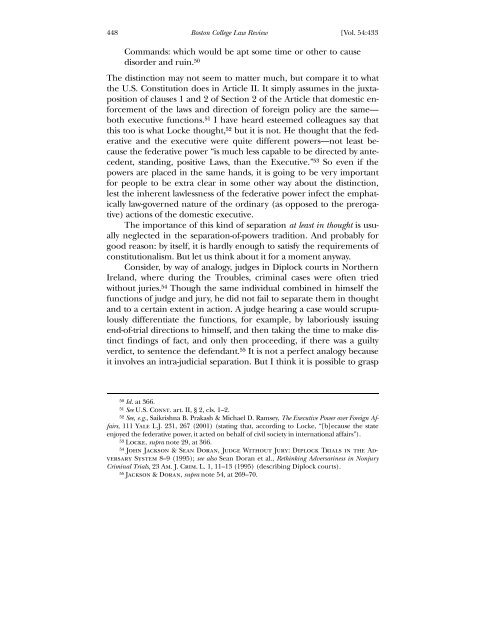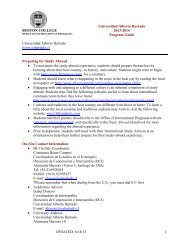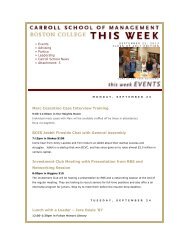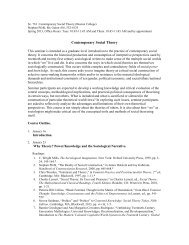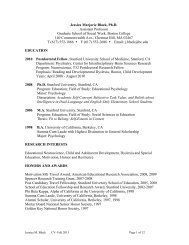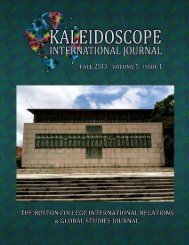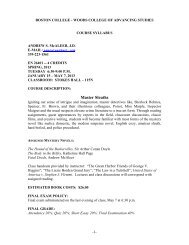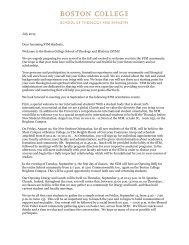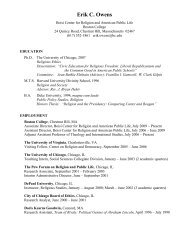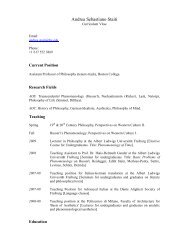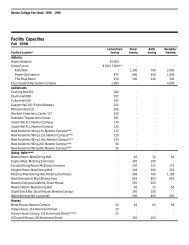separation of powers in thought and practice? - Boston College
separation of powers in thought and practice? - Boston College
separation of powers in thought and practice? - Boston College
Create successful ePaper yourself
Turn your PDF publications into a flip-book with our unique Google optimized e-Paper software.
448 <strong>Boston</strong> <strong>College</strong> Law Review [Vol. 54:433<br />
Comm<strong>and</strong>s: which would be apt some time or other to cause<br />
disorder <strong>and</strong> ru<strong>in</strong>.50<br />
The dist<strong>in</strong>ction may not seem to matter much, but compare it to what<br />
the U.S. Constitution does <strong>in</strong> Article II. It simply assumes <strong>in</strong> the juxtaposition<br />
<strong>of</strong> clauses 1 <strong>and</strong> 2 <strong>of</strong> Section 2 <strong>of</strong> the Article that domestic enforcement<br />
<strong>of</strong> the laws <strong>and</strong> direction <strong>of</strong> foreign policy are the same—<br />
both executive functions.51 I have heard esteemed colleagues say that<br />
this too is what Locke <strong>thought</strong>,52 but it is not. He <strong>thought</strong> that the federative<br />
<strong>and</strong> the executive were quite different <strong>powers</strong>—not least because<br />
the federative power “is much less capable to be directed by antecedent,<br />
st<strong>and</strong><strong>in</strong>g, positive Laws, than the Executive.”53 So even if the<br />
<strong>powers</strong> are placed <strong>in</strong> the same h<strong>and</strong>s, it is go<strong>in</strong>g to be very important<br />
for people to be extra clear <strong>in</strong> some other way about the dist<strong>in</strong>ction,<br />
lest the <strong>in</strong>herent lawlessness <strong>of</strong> the federative power <strong>in</strong>fect the emphatically<br />
law-governed nature <strong>of</strong> the ord<strong>in</strong>ary (as opposed to the prerogative)<br />
actions <strong>of</strong> the domestic executive.<br />
The importance <strong>of</strong> this k<strong>in</strong>d <strong>of</strong> <strong>separation</strong> at least <strong>in</strong> <strong>thought</strong> is usually<br />
neglected <strong>in</strong> the <strong>separation</strong>-<strong>of</strong>-<strong>powers</strong> tradition. And probably for<br />
good reason: by itself, it is hardly enough to satisfy the requirements <strong>of</strong><br />
constitutionalism. But let us th<strong>in</strong>k about it for a moment anyway.<br />
Consider, by way <strong>of</strong> analogy, judges <strong>in</strong> Diplock courts <strong>in</strong> Northern<br />
Irel<strong>and</strong>, where dur<strong>in</strong>g the Troubles, crim<strong>in</strong>al cases were <strong>of</strong>ten tried<br />
without juries.54 Though the same <strong>in</strong>dividual comb<strong>in</strong>ed <strong>in</strong> himself the<br />
functions <strong>of</strong> judge <strong>and</strong> jury, he did not fail to separate them <strong>in</strong> <strong>thought</strong><br />
<strong>and</strong> to a certa<strong>in</strong> extent <strong>in</strong> action. A judge hear<strong>in</strong>g a case would scrupulously<br />
differentiate the functions, for example, by laboriously issu<strong>in</strong>g<br />
end-<strong>of</strong>-trial directions to himself, <strong>and</strong> then tak<strong>in</strong>g the time to make dist<strong>in</strong>ct<br />
f<strong>in</strong>d<strong>in</strong>gs <strong>of</strong> fact, <strong>and</strong> only then proceed<strong>in</strong>g, if there was a guilty<br />
verdict, to sentence the defendant.55 It is not a perfect analogy because<br />
it <strong>in</strong>volves an <strong>in</strong>tra-judicial <strong>separation</strong>. But I th<strong>in</strong>k it is possible to grasp<br />
50 Id. at 366.<br />
51 See U.S. Const. art. II, § 2, cls. 1–2.<br />
52 See, e.g., Saikrishna B. Prakash & Michael D. Ramsey, The Executive Power over Foreign Affairs,<br />
111 Yale L.J. 231, 267 (2001) (stat<strong>in</strong>g that, accord<strong>in</strong>g to Locke, “[b]ecause the state<br />
enjoyed the federative power, it acted on behalf <strong>of</strong> civil society <strong>in</strong> <strong>in</strong>ternational affairs”).<br />
53 Locke, supra note 29, at 366.<br />
54 John Jackson & Sean Doran, Judge Without Jury: Diplock Trials <strong>in</strong> the Adversary<br />
System 8–9 (1995); see also Sean Doran et al., Reth<strong>in</strong>k<strong>in</strong>g Adversar<strong>in</strong>ess <strong>in</strong> Nonjury<br />
Crim<strong>in</strong>al Trials, 23 Am. J. Crim. L. 1, 11–13 (1995) (describ<strong>in</strong>g Diplock courts).<br />
55 Jackson & Doran, supra note 54, at 269–70.


